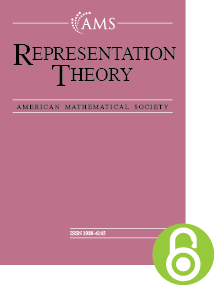An induction theorem for groups acting on trees
HTML articles powered by AMS MathViewer
- by Martin H. Weissman
- Represent. Theory 23 (2019), 205-212
- DOI: https://doi.org/10.1090/ert/526
- Published electronically: May 29, 2019
- PDF | Request permission
Abstract:
If $G$ is a group acting on a locally finite tree $X$, and $\mathscr {S}$ is a $G$-equivariant sheaf of vector spaces on $X$, then its compactly-supported cohomology is a representation of $G$. Under a finiteness hypothesis, we prove that if $H_c^0(X, \mathscr {S})$ is an irreducible representation of $G$, then $H_c^0(X, \mathscr {S})$ arises by induction from a vertex or edge stabilizing subgroup.
If $\boldsymbol {\mathrm {G}}$ is a reductive group over a nonarchimedean local field $F$, then Schneider and Stuhler realize every irreducible supercuspidal representation of $G = \boldsymbol {\mathrm {G}}(F)$ in the degree-zero cohomology of a $G$-equivariant sheaf on its reduced Bruhat-Tits building $X$. When the derived subgroup of $\boldsymbol {\mathrm {G}}$ has relative rank one, $X$ is a tree. An immediate consequence is that every such irreducible supercuspidal representation arises by induction from a compact-mod-center open subgroup.
References
- Colin J. Bushnell and Philip C. Kutzko, The admissible dual of $\textrm {GL}(N)$ via compact open subgroups, Annals of Mathematics Studies, vol. 129, Princeton University Press, Princeton, NJ, 1993. MR 1204652, DOI 10.1515/9781400882496
- Lisa Carbone, On the classification of rank 1 groups over non-archimedean local fields, Lecture notes from a $p$-adic groups seminar at Harvard University.
- Ju-Lee Kim, Supercuspidal representations: an exhaustion theorem, J. Amer. Math. Soc. 20 (2007), no. 2, 273–320. MR 2276772, DOI 10.1090/S0894-0347-06-00544-3
- G. I. Ol′šanskiĭ, Classification of the irreducible representations of the automorphism groups of Bruhat-Tits trees, Funkcional. Anal. i Priložen. 11 (1977), no. 1, 32–42, 96 (Russian). MR 0578650
- Peter Schneider and Ulrich Stuhler, Representation theory and sheaves on the Bruhat-Tits building, Inst. Hautes Études Sci. Publ. Math. 85 (1997), 97–191. MR 1471867, DOI 10.1007/BF02699536
- Shaun Stevens, The supercuspidal representations of $p$-adic classical groups, Invent. Math. 172 (2008), no. 2, 289–352. MR 2390287, DOI 10.1007/s00222-007-0099-1
- J. Tits, Reductive groups over local fields, Automorphic forms, representations and $L$-functions (Proc. Sympos. Pure Math., Oregon State Univ., Corvallis, Ore., 1977) Proc. Sympos. Pure Math., XXXIII, Amer. Math. Soc., Providence, R.I., 1979, pp. 29–69. MR 546588
- Marie-France Vignéras, Cohomology of sheaves on the building and $R$-representations, Invent. Math. 127 (1997), no. 2, 349–373. MR 1427623, DOI 10.1007/s002220050124
- Jiu-Kang Yu, Construction of tame supercuspidal representations, J. Amer. Math. Soc. 14 (2001), no. 3, 579–622. MR 1824988, DOI 10.1090/S0894-0347-01-00363-0
Bibliographic Information
- Martin H. Weissman
- Affiliation: Department of Mathematics, University of California, Santa Cruz, California 95064
- MR Author ID: 718173
- Email: weissman@ucsc.edu
- Received by editor(s): October 30, 2018
- Received by editor(s) in revised form: December 10, 2018
- Published electronically: May 29, 2019
- Additional Notes: The Simons Foundation Collaboration Grant #426453 supported this work
- © Copyright 2019 American Mathematical Society
- Journal: Represent. Theory 23 (2019), 205-212
- MSC (2010): Primary 20G25, 20E08, 22E50
- DOI: https://doi.org/10.1090/ert/526
- MathSciNet review: 3955571


